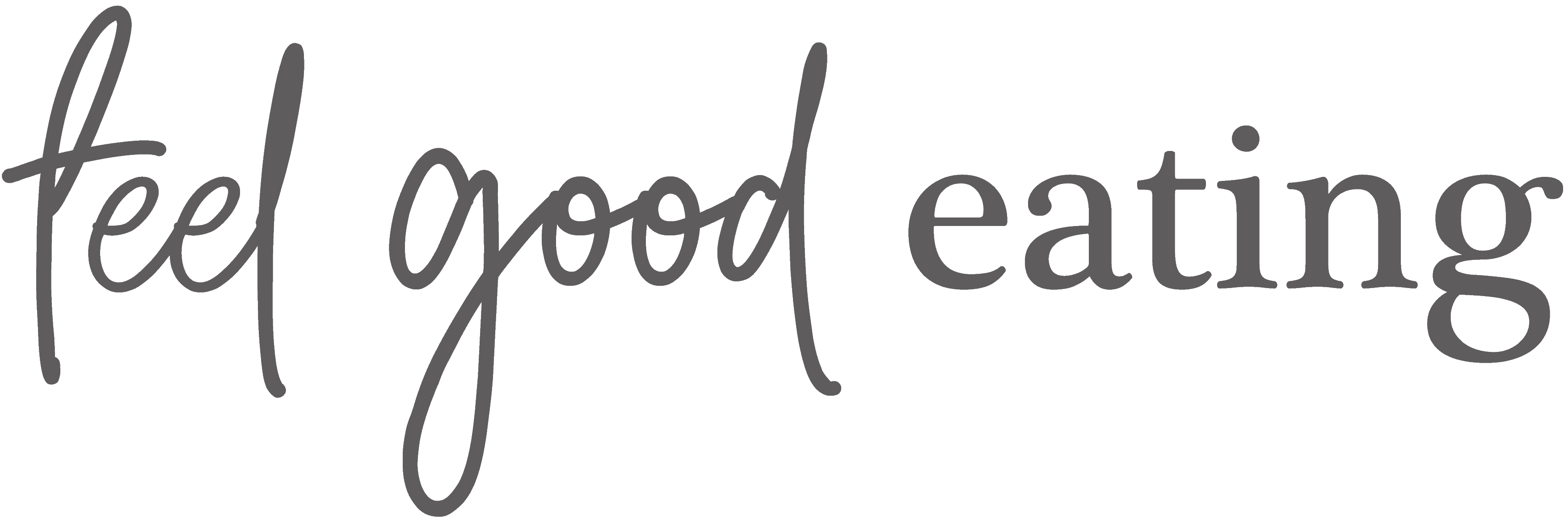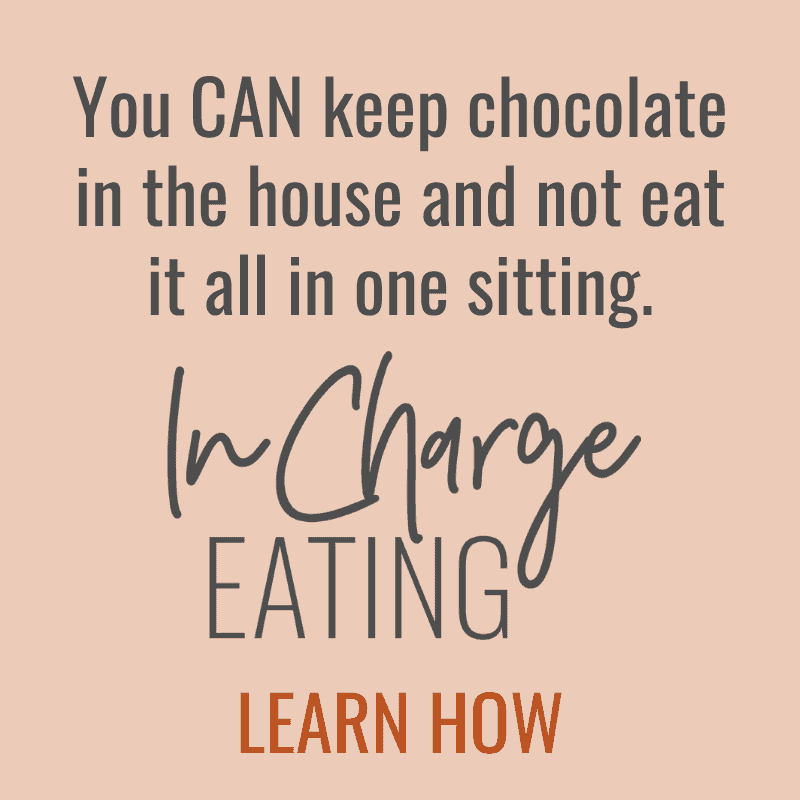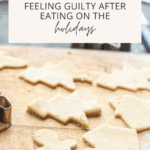Feeling guilty, bad, disappointed, or frustrated with yourself about what you’ve eaten is an experience that can happen at any point during the year.
But it tends to kick up a notch over the holidays.
There’s more food around, more opportunities and events that involve food, plus all of the “let’s catch up before the end of the year” brunches and drinks.
So, if you’re working on cultivating a more positive relationship with food, you might be wondering:
- How do I stop feeling guilty after eating? (if I’ve eaten ‘more than usual’ because of the holidays)
- How do I not compensate for feeling guilty about eating by doing diet-y things like over-exercising, restricting or giving myself food rules?
Why do I feel guilty after eating?
Let’s start with the very real experience of food guilt.
We experience guilt when we believe that we have done something wrong.
And we have been taught to believe that eating – specifically – eating ‘too much’ or eating the ‘wrong’ kinds of foods is morally wrong.
So, when we do eat more than our ‘usual’ rhythm, or we’re eating foods that we have filed away in the ‘bad’, ‘unhealthy’, ‘junk’ category in our mind, it sparks the; “I’ve done the wrong thing” response, leading to feelings of guilt.
But,
- you’re not doing the wrong thing by nourishing your body with food;
- you’re not doing the wrong thing when nourishing your body takes you to a place where you are past comfortable fullness; and
- you’re not doing the wrong thing by eating more than you might usually because it is the holidays.
How do I stop feeling guilty after eating over the holidays?
When you notice that you are feeling guilty after eating, I invite you to shift the focus of blame away from yourself and towards where it actually belongs – Diet Culture.
For conditioning you to believe that eating and eating past fullness is breaking a rule, doing it wrong, or ‘being bad.’
To tackle this question a bit more, I have written a bunch of articles that offer some ideas on how to navigate the things that can leave us vulnerable to overeating (which is a completely human experience BTW), rather than trying really, really hard to avoid it.
How to stop feeling guilty about overeating
This one’s not as self-explanatory as the title suggests! But it explores the various things that can leave us vulnerable to eating past the point of comfortable fullness and how you might protect yourself from those vulnerabilities.
What to do when people push food on you
Written specifically for the holiday season, it offers some ideas on how to assert boundaries with people who force food on you.
What to do after binge eating
The strategies and ideas in this post are applicable to anyone – you don’t need to experience binge eating to check them out.
How do I not compensate for feeling guilty about eating?
How do I stop feeling guilty for eating? and How do I not compensate for feeling guilty? are questions that go hand-in-hand because the urge to compensate for overeating is usually a response to feeling guilty.
Because last time I checked, guilt is not an emotion that generates pleasant sensations within the body.
Guilt normally feels uncomfortable or downright unpleasant.
So, it makes sense that we want to do something to make that discomfort go away.
Repenting for eating past fullness, by restricting what we eat at the next meal or over the next day, or ‘burning it off’ through exercise helps us not feel that guilt anymore. Diet Culture has taught us so.
The same strategies and resources I mentioned above can also be helpful when that urge to compensate pops its head up.
And, I invite you to meet that urge with some curiosity and kindness:
- Why is that urge really there? Remind yourself that guilt and eating (and even overeating) don’t belong together. They are a construct from Diet Culture and you can reject them if you want to.
- Ask yourself if engaging in compensatory behaviours aligns with your values, and what you want your relationship with food and eating to be like.
- Offer yourself comfort in knowing that eating past fullness is a human experience. We all do it, and the holiday period is a time ripe for it – it’s bound to happen!
- If you are still feeling physically uncomfortable, try some of the strategies in this article
This is a topic that is really complex and nuanced and I could probably write on it forever, but I hope what I have shared here provides some places to start.
And that they help you stay present and enjoy however you spend your holidays.



 Hi! My name is Nina.
I’m a Certified Intuitive Eating Counsellor taking the ‘diet’ out of Dietitian. I am here to help you reject diet culture, tune into your body’s own inner wisdom about how to truly nourish yourself and ultimately feel good eating™
Hi! My name is Nina.
I’m a Certified Intuitive Eating Counsellor taking the ‘diet’ out of Dietitian. I am here to help you reject diet culture, tune into your body’s own inner wisdom about how to truly nourish yourself and ultimately feel good eating™ 
